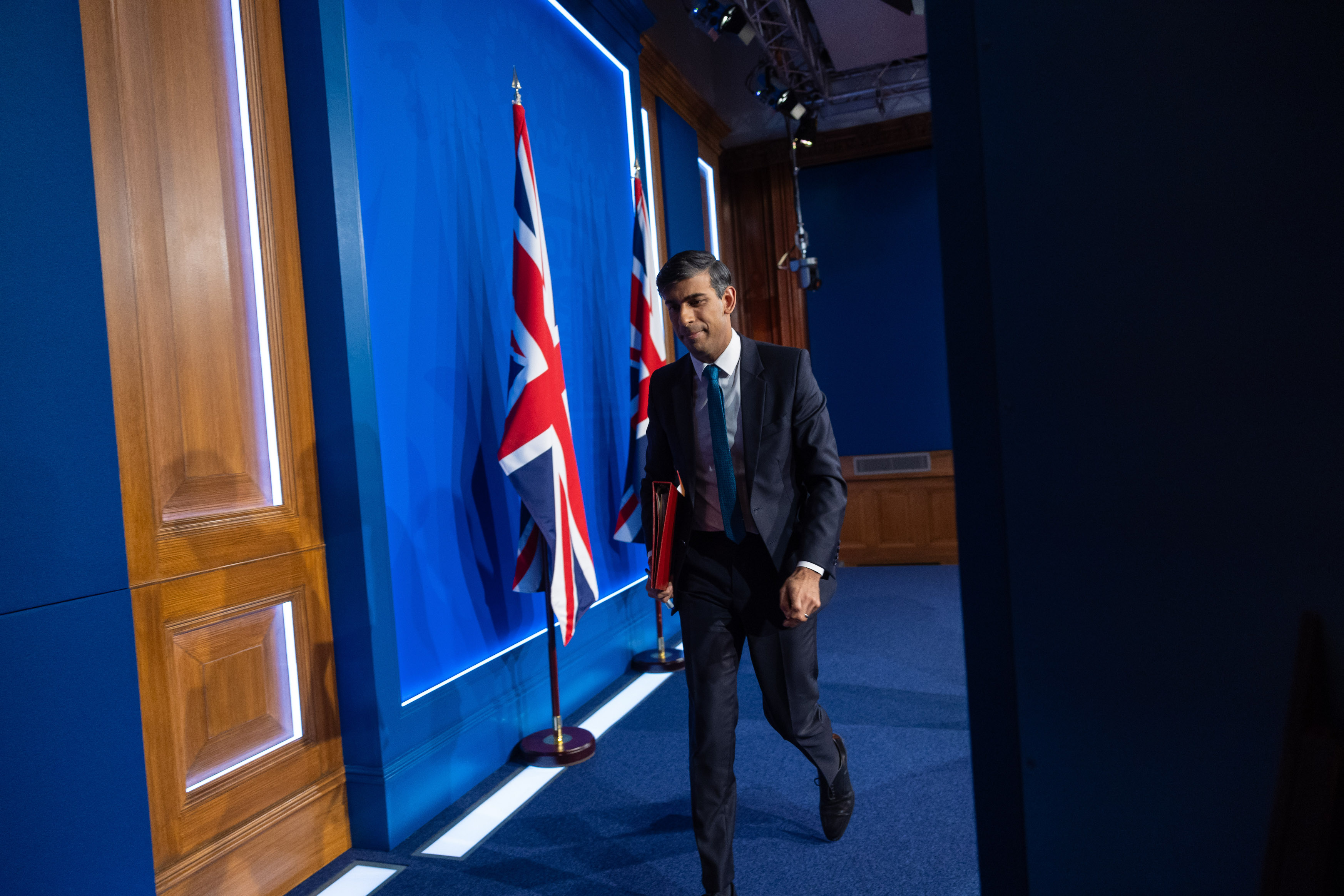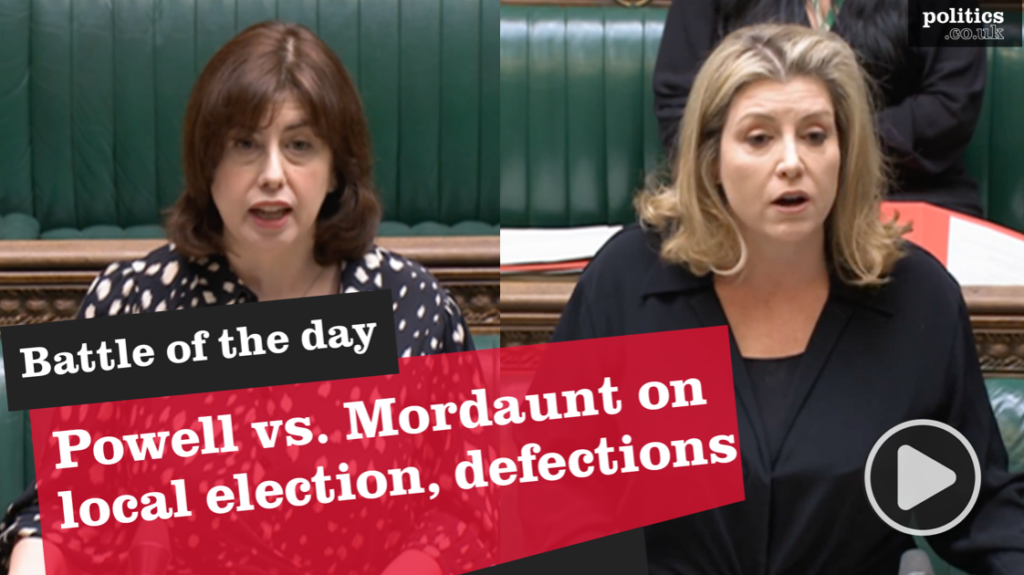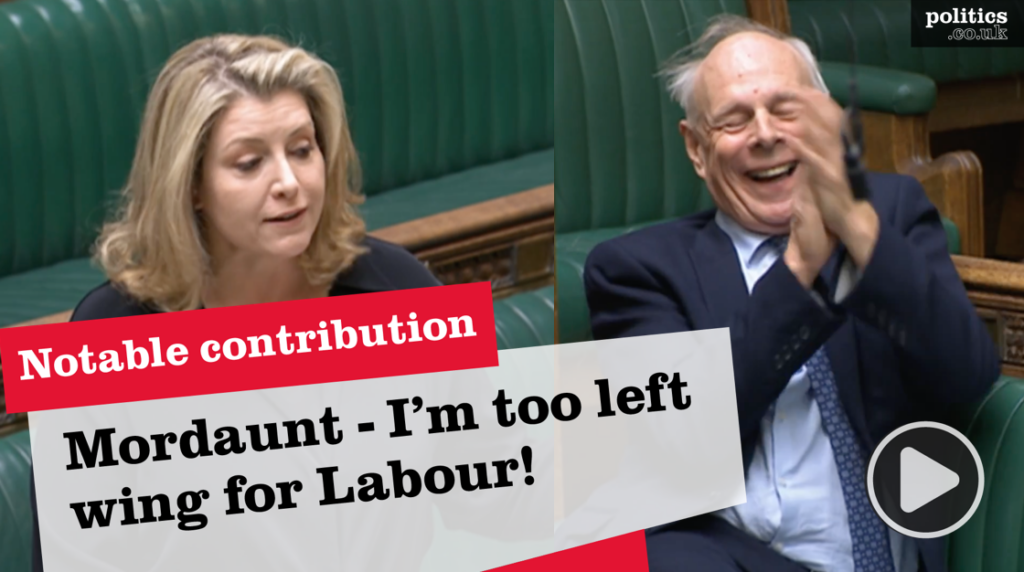For months in advance, the autumn statement had been lauded as the climactic finale of the prime minister’s totemic reset era. The burgeoning crescendo of a more openly antagonistic, more unapologetically ambitious mode of politics would reach its zenith during the fiscal event, as it expanded upon the pitches rolled consecutively at Conservative Party conference and during the King’s Speech — together two-thirds of Sunak’s relaunch platform.
That, at least, was No 10’s ostensible strategy. Because ahead of Jeremy Hunt’s fiscal event this week, the polling seemed to show that the Conservative’s recent reset set-pieces had — rather than operate as chrysalis chambers from which Sunak could emerge newly energised — strengthened public opinion against the party. The Conservative conference in Manchester and the King’s Speech at best failed to shift the dial and, at worst, proved a catalyst for intensifying intra-party disputes. All the while, Labour’s polling lead has only increased.
Thus, an autumn statement, however bracing, was never going to make the political wrongs of party conference and the King’s Speech right. Nor was the address from Hunt, that long-survivor of Conservative governance, going to finally land Rishi Sunak’s apparently abandoned “change candidate” strategy.
But it could still do a few things: it could satiate some of Sunak’s sceptics with a tax sop and, in turn, ease tension in the party. It could take the battle to the Labour by laying traps for the party and tightening Keir Starmer’s policy straitjacket. And, most importantly, it could add an element of coherence to — and sharpen up — the Conservative Party’s political pitch.


In this way, it seemed Hunt, hinting at more to come, was presenting a classic binary choice before the electorate: prudent tax cutting with the Conservatives, or debt-funded spending with Labour. A coherent narrative — no small feat after the flailing and at times implausible emphases of party conference and the King’s Speech — had been forwarded from the despatch box.
Of course, the sleight of hand and the gaming of fiscal rules which underpin Hunt’s giveaways remain moot — as is the question of whether Hunt’s “110 measures for growth”, in time, justify themselves as an economic strategy. Then there’s the electoral-political issue that voters may opt to give the chancellor no credit as they are inexorably dragged into higher tax bands. Still, viewed in full, the autumn statement can be filed in the cabinet marked “rare political success” for Rishi Sunak.
That, in essence, is what went right for Sunak this week. And this was worth relating at length because, (1), things so rarely do for this prime minister; and, (2), it gives a sense of what political discourse might look like today if matters had not unravelled almost immediately in the aftermath.
In the end, the steady political advances made in Hunt’s autumn statement, and the stillness it inspired in Sunak’s sceptics, were soon scuppered as Conservative hostilities resumed once more in the wake of the new immigration figures published on Wednesday.
The statistics showed net migration to the UK in the 12 months to June this year was 672,000, while net migration last year has been revised upwards to a record high of 745,000. The bulk of migration has come from student, work and family visa routes, particularly those in the health and social care sector, as well as legal asylum channels from Ukraine, Afghanistan and Hong Kong. But engagement with nuance does not a Conservative psychodrama make.
Thus, Suella Braverman, the former home secretary who would have presided over these statistics had she not gone rogue in recent weeks, said the figures were a “slap in the face to the British public”.
Sir Simon Clarke, who would have been either chief secretary to the Treasury or levelling up secretary presiding over these statistics (depending on your consideration of either Johnsonian or Trussite counterfactuals), called for an “urgent change of approach”.
Sir Jacob Rees-Mogg, who could have been Brexit opportunities minister or business secretary presiding over these statistics, declared “we have failed” on migration.
‘We have failed’: Jacob Rees-Mogg apologises for Conservative record on migration
Boris Johnson, who would have been prime minister presiding over these statistics, likened Britain’s migration system to a “Ponzi scheme”. It was, after all, Johnson’s government that made the conscious choice to liberalise immigration rules post-Brexit. Alongside pushing NHS and social care visas, his cabinet ministers — many of whom are listed above — collectively resolved to make it easier for international students to stay and work in Britain for two years after graduating.
Still, Sunak’s migration dilemma goes some distance deeper than surface-level blame-shifting and the consequent posturing. In fact, it has been pointed out that the simultaneous siren calls for tax cuts in the lead up to the autumn statement, and hardline immigration controls in the wake of the migration of figures, are illustrative of the Conservative Party’s enduring identity crisis. The FT’s Stephen Bush zooms in on the case of former minister Neil O’Brien, who left his post in the Department of Health and Social Care less than two weeks ago. Bush writes:
To take an illustrative example: Neil O’Brien, the MP for Harborough, has written a lengthy piece on his new Substack calling for the UK government to rethink its approach to migration, and to pay social care workers more. That’s the same O’Brien who has welcomed this week’s tax-cutting budget — tax cuts that mean lower public spending
Bush concludes: “The big problem here is that the Conservatives badly need to have a big and bruising fight over what type of party they want to be”.
Also significant in this regard is the fact that growth forecasts, already downgraded by the Office for Budget Responsibility on Wednesday, would have been even worse if legal migration was lower.
This trade-off, perhaps more so than that highlighted by Bush, speaks to a core divide in the Conservative Party: a split between those MPs whose animating political principle surrounds “culture” and its purported defence, such as the New Conservatives and Suella Braverman’s supporting sets. And those whose raison d’être is “growth”, individuals like Liz Truss and the MPs who make up her Conservative Growth Group. This latter faction, on the whole, is willing to countenance higher migration levels if they act as a harbinger of economic advance. The New Conservatives, certainly, take the opposite view.
This divide is right now rumbling beneath the surface of Rishi Sunak’s Conservative Party, masked by the reductive moniker “party right”. One of the few times this dynamic has been exposed in recent years was during Suella Braverman’s first unbecoming departure from government in the throes of Liz Truss’ ailing administration. Her resignation missive, soon overshadowed by the then-PM’s own exit, outlined in one section: “I have had serious concerns about this Government’s commitment to honouring manifesto commitments, such as reducing overall migration numbers”. It followed reports that Liz Truss was planning to welcome more immigration in an effort to fill vacancies and drive growth by updating the shortage occupations list.
It begs the question of people like Jacob Rees-Mogg and Simon Clarke who seek to straddle both sides of this Conservative right divide. Coherence does not, it seems, even extend to Sunak’s primary antagonists: it suggests both that the party’s problems are far deeper than the prime minister and that they will long outlive him.
Step back and it also underlines, (1), what a success the autumn statement was in silencing Sunak’s critics and, (2), how little that success matters. In the wake of his autumn statement, Jeremy Hunt had giddily replied to Jake Berry, former Conservative Party chairman under Truss, who had led a campaign of 33 rebel MPs saying they would refuse to back any autumn statement that included tax rises. Hunt’s victory lap, of course, did not garner nearly the same attention as his pre-statement posturing. And any broader sense of momentum was lost amid the intra-party hostilities over the migration that soon flowed from a separate faction.
In a sense, this is illustrative of the fact that Rishi Sunak’s wins rarely register, while his losses always do. For every small victory, a more significant problem will soon rear its head for the dispossessed and discontented in the Conservative parliamentary to collectively interpret as “existential”. (This dynamic was essentially admitted by the New Conservatives on Thursday).
For every competently managed reshuffle, there is a Supreme Court Rwanda ruling. For every autumn statement, a new round of migration statistics.
It is dire dynamic which shows no sign of letting up as British politics ambulates the long path to a general election. Indeed, as we edge towards a national poll, so too do we creep inexorably closer to a potential post-Sunak leadership contest. Hunt may have tried to focus minds by floating the prospect of an early election — but intra-party imperatives, as considered by jostling factions, do not tend only towards unity. The opposite may be true as factions compete to forward their varying visions of a post-Sunak future.
Ultimately, are rolling backbench rebellions not rather more “existential” regarding the Conservative Party’s performance at the next election than those issues seized upon by rebel MPs; especially those — in the case of the migration figures — that be explained by aberrant international circumstance, or policy choices pursued under a PM once preferred by said rebels?
“Unite or die”, Sunak privately told MPs just hours after becoming leader of the party. Many Conservative MPs, it seems, have long chosen their option. It means, for all the criticisms one can levy at Sunak’s strategies — and there have been many (criticisms and strategies, that is) — one wonders whether any level of prime ministerial coherence could much compensate for the incessant manoeuvring from his backbench rank and file.
Josh Self is Editor of Politics.co.uk, follow him on Twitter here.
Politics.co.uk is the UK’s leading digital-only political website, providing comprehensive coverage of UK politics. Subscribe to our daily newsletter here.












